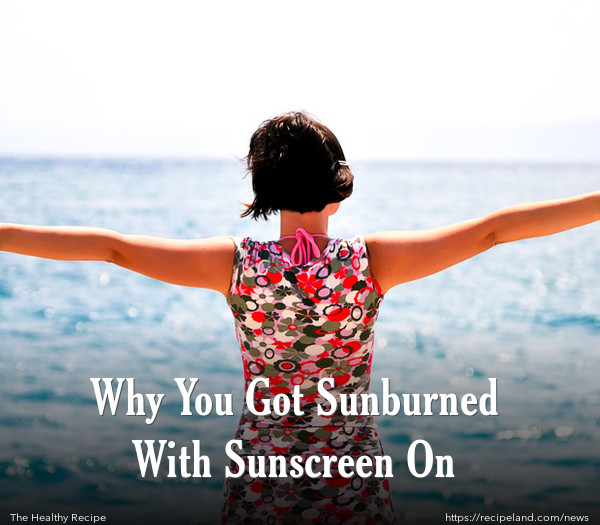Wearing sunscreen is not the only answer to avoiding sunburn. There may be other risk factors involved. Learn about how to save your skin.
1. Reading outside on an iPad.
A recent study conducted at the University of New Mexico found that the glare reflected from an iPad increased sun exposure by nearly 85%. By setting up a mannequin equipped with UV-detecting sensors, they examined multiple electronic and mobile devices and the effects on the mannequin. Using an iPhone increased exposure by more than 35%. Make sure you are under an umbrella or a tree if you are using these devices outdoors—and still wear plenty of sunscreen.
2. You drink alcohol.
Researchers at Harvard Medical School examined data collected from more than 300,000 people during 2006 and made at least two important findings. One, sunburn is very common, with about a third of people reporting that they had had a sunburn during the previous year. The second finding was that sunburn was more likely for those respondents who drank alcohol on a regular basis. Those who drink heavily had nearly a 25% increase in risk of sunburn, as compared with those who never or rarely drank. Almost 20% of sunburns can be associated with alcohol use, according to lead researcher Kenneth J. Mukamal, M.D.
3. You have been diagnosed with an autoimmune disease.
Those with autoimmune diseases like lupus, rheumatoid arthritis, and Crohn’s disease often have more sensitive skin, and are more likely to be sunburned than those with fully functioning immune systems.
Mona Gohara, M.D., associate clinical professor of dermatology at Yale School of Medicine explained that having a certain ‘pattern’ to the sunburn can often be a clue to other conditions. She states, “Sunburn and skin cancer are more likely for the 50 million Americans who have an autoimmune disease, so in addition to employing sun-safety measures, experts advise during monthly self-skin exams and seeing your dermatologist twice a year (or as recommended) for skin checks.”
4. You’re taking antibiotics.
Certain medications, particularly antibiotics, can increase the skin’s sensitivity to sun and cause you to burn more quickly than you might expect, even if you are wearing sunscreen. While many over-the-counter pain medications, oral contraceptives, and antidepressants can lead to increased sun sensitivity, it is antibiotics that are more commonly the culprit.
This sensitivity can be reversed when you stop taking the medications and they are out of your system, but this can take some time. Be particularly careful if you are taking doxycycline, ciprofloxacin, or topical retinoids such as isotretinoin, acitretin, tazarotene or tretinoin. If you are concerned about sun sensitivity, check with your doctor or pharmacist.
5. You’re not happy with your appearance.
Those who view themselves as less attractive may tend to spend more time in the sun and also be less likely to apply sunscreen. This can increase the chances of not only getting sunburned, but also developing skin cancer.
A study published in Health Psychology reported that people tend to think that they are more attractive when they are tan because it may hide certain skin imperfections or make them appear more fit and toned.
6. You recently exfoliated.
When you exfoliate your skin, you remove the outer layer of dead skin cells and make your skin smoother. Using mechanical cleansing devices or retinoids, alpha-hydroxy acids like glycolic acids can make the skin more susceptible to sunburn. When you rejuvenate your skin, it is even more important to be aware of your exposure to UV rays, wear plenty of sunscreen and spend more time in the shade.
7. Your sunscreen is expired.
Using a container of sunscreen that you found stuffed in your glove compartment from two summers ago is not always the best idea. Although most sunscreen has a long shelf life based on the expiration dates, replacing it frequently is a good idea.
Sunscreen is intended to maintain integrity when kept in a “normal, ambient environment” according to the Skin Cancer Foundation. However, sunscreen is often not stored properly, exposed to high temperatures or exposed to temperature extremes.
8. You wear a shirt at the beach.
You might think that you are protecting yourself by wearing a shirt at the beach, even a shirt with UV protection, you are still more likely to get sunburned. Your exposure increases when your shirt gets wet, since a t-shirt only provides a maximum of 7 SPF. Dr.
Gohara states, “we see a lot of melanoma on the trunk and back because people wrongly think they’re protecting themselves by wearing a t-shirt.” If you want to wear a shirt at the beach, find fabric that effectively shields you from UVA and UVB rays, which helps you when you don’t want to wear sunscreen because you are protected in the areas that are covered.
Protecting yourself from sunburn is important for your health, so wearing sunscreen helps but be aware of these other potential risk factors.










Comments